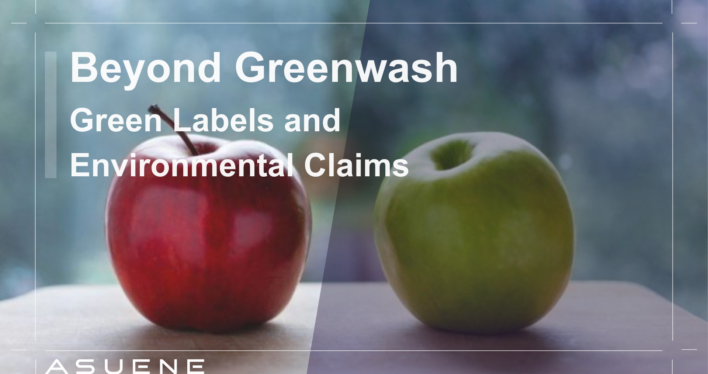- Article Summary
-
In an era where climate change, biodiversity loss, and resource scarcity have become central concerns, businesses are under increasing pressure to demonstrate their commitment to sustainability.
One prominent way to communicate environmental responsibility is through the use of green labels—certifications that indicate compliance with specific environmental standards.
However, the surge in environmental marketing has also led to a corresponding increase in greenwashing—the practice of making misleading or unsubstantiated environmental claims.
To address these challenges, the United States and the European Union have intensified regulatory efforts to ensure that green labels and environmental claims are truthful, transparent, and scientifically based.
This article provides a comprehensive overview of green labels, analyzes the regulatory landscapes in the U.S. and EU, and offers strategic recommendations for companies operating in this increasingly regulated domain.
Understanding Green Labels and the Risks of Greenwashing
Green labels, also known as environmental labels or eco-labels, are certifications awarded to products or services that meet predefined environmental performance criteria. These labels help consumers make more sustainable choices by identifying products with reduced environmental impacts across their lifecycle.
Common Examples of Green Labels
| Label Name | Scope | Focus Area |
|---|---|---|
| EU Ecolabel | European Union | Lifecycle environmental impact |
| Safer Choice | United States | Chemical safety |
| Energy Star | United States (Global) | Energy efficiency |
| FSC Certification | Global | Sustainable forest management |
| Fair Trade | Global | Ethical sourcing and social fairness |
Despite their benefits, the rise in the number of green labels, some of which are self-declared and lack rigorous verification, has led to consumer confusion and increased skepticism.
What is Greenwashing?
Greenwashing refers to the use of deceptive marketing strategies that falsely portray a company’s products, services, or practices as environmentally friendly.
Common types of greenwashing include:
- Vague or general claims such as “eco-friendly” without concrete evidence
- Hidden trade-offs where a single positive environmental attribute is highlighted while ignoring significant negative impacts
- Lack of verifiability, where no supporting information is available
- Use of false labels that mimic legitimate eco-certifications
Risks Associated with Greenwashing
Companies engaging in greenwashing risk facing regulatory penalties, reputational damage, consumer boycotts, and litigation.
The need for credible, verifiable environmental communication has never been greater.

Regulatory Developments: Europe and the United States
European Union Regulations
The European Union has been at the forefront of regulating environmental claims to combat greenwashing and protect consumers.
Green Claims Directive
Introduced in 2023, the Green Claims Directive mandates that companies substantiate any environmental claims with scientific evidence and obtain independent verification.
Under this directive:
- Broad claims such as “climate neutral” must be backed by quantifiable data.
- Companies must disclose methodologies used to assess environmental impacts.
- Claims based solely on carbon offsetting are restricted unless combined with actual emissions reduction efforts.
The Directive aligns with the EU’s broader Sustainable Product Policy Framework and supports its goals under the European Green Deal.
Ban on Carbon Offset-Based Claims
In 2024, the European Parliament and Council agreed to a ban on claims relying purely on carbon offsets.
Starting in 2026, companies advertising their products as “carbon neutral” without actual emissions reductions will face enforcement actions, including fines and product recalls.
Reinforcement of the EU Ecolabel
The EU Ecolabel, originally established in 1992, is being strengthened to improve trustworthiness.
The enhancements focus on:
- Expanding the range of eligible product categories
- Introducing stricter environmental criteria
- Improving third-party auditing and compliance mechanisms
United States Regulations
Compared to the EU, the United States has adopted a more flexible, guidance-based approach, primarily through the Federal Trade Commission (FTC) and the Environmental Protection Agency (EPA).
FTC Green Guides
The FTC’s Green Guides provide voluntary guidelines for marketers to avoid deceptive environmental claims.
The Green Guides recommend:
- Claims must be specific, verifiable, and not misleading
- If qualifications are necessary to prevent deception, they must be clear and prominent
- Certifications and seals of approval must reflect the expertise of independent third parties
The Green Guides are currently under review for updates to address issues such as carbon neutrality, recyclability, and organic claims.
EPA Safer Choice Program
The EPA’s Safer Choice program certifies products that use safer chemical ingredients.
Products bearing the Safer Choice label undergo:
- Rigorous assessment of ingredient toxicity and environmental impact
- Performance testing to ensure products meet high efficacy standards
The program promotes transparency and provides consumers with reliable options for safer and more sustainable purchasing.

Key Differences and Comparative Analysis
The regulatory approaches between Europe and the United States differ significantly, reflecting broader cultural and political differences regarding sustainability governance.
| Dimension | European Union | United States |
|---|---|---|
| Legal Framework | Mandatory (Directive-based) | Voluntary (Guidance-based) |
| Claim Verification | Independent third-party verification mandatory | Encouraged but not compulsory |
| Focus | Prevention of misleading claims and greenwashing | Promotion of truthful advertising |
| Penalties for Non-Compliance | Fines, product bans, mandatory retraction | FTC enforcement through litigation |
| Future Trends | Expansion of environmental product legislation | Strengthening Green Guides and sector-specific rules |
The EU’s approach emphasizes binding obligations, transparency, and comprehensive lifecycle assessments, whereas the U.S. framework emphasizes consumer protection through non-binding guidelines.
Strategic Implications for Companies
Given the increasing complexity of environmental marketing regulations, companies must proactively adapt their sustainability communication strategies.
Recommendations for Businesses
- Conduct Lifecycle Assessments (LCAs)
Ensure that claims are supported by comprehensive environmental assessments covering the entire product lifecycle. - Obtain Credible Certifications
Prioritize recognized labels such as the EU Ecolabel, Safer Choice, Energy Star, or FSC Certification. - Develop Transparent Communication Strategies
Provide clear and accessible evidence supporting environmental claims, including links to third-party studies or certifications. - Integrate Compliance into Product Development
Embed environmental criteria from the design phase to avoid costly retrofitting or rebranding later. - Stay Informed and Update Practices Regularly
Monitor developments in both regional and global regulatory landscapes to remain compliant and competitive.
Preparing for the Future
Companies that invest in credible sustainability initiatives and honest communication today will be better positioned to succeed as regulations tighten and consumer expectations grow.
By aligning product strategies with regulatory requirements and consumer demand for authenticity, businesses can not only mitigate risk but also build enduring brand loyalty and unlock new market opportunities.
Why Work with ASUENE Inc.?
Asuene is a key player in carbon accounting, offering a comprehensive platform that measures, reduces, and reports emissions, including Scope 1-3, with expertise in decarbonization. Asuene serves over 10,000 clients worldwide, providing an all-in-one solution that integrates GHG accounting, ESG supply chain management, LCA, and third-party verification.
ASUENE supports companies in achieving net-zero goals through advanced technology, consulting services, and an extensive network.


